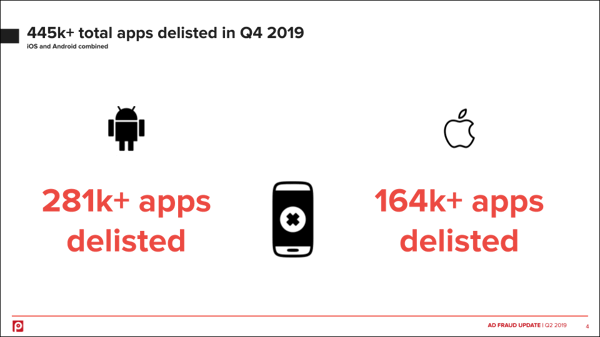
This week's review of ad fraud and quality in the digital advertising space.

Pixalate has released new research into the hundreds of thousands of mobile apps that were delisted in Q4 2019 across the Google Play Store and the Apple App Store.

"With less competition in the auction, low quality ads — and even publishers’ own house ads — are now making their way to the most prized ad slots on homepages," wrote Digiday. "The fraudsters have quickly leaped into action."

Tim Armstrong, former CEO of AOL, predicts that COVID-19 "will devastate ad spending," according to The Information. “For the first time in history, you’re probably going to have the highest point of media usage in the history of the United States and the lowest point of advertising in the U.S.,” Armstrong said to The Information in an interview.

According to eMarketer, citing an Advertiser Perceptions survey, 49% of agencies have held back a campaign from launching until later in the year, 45% have stopped a campaign mid-flight, and 38% have paused all new ad efforts. Learn more.

Rubicon Project and Telaria this week closed their merger, "officially forming the largest independent supply-side platform on the market," wrote Adweek. "The combined company is pushing hard in CTV while there's still no single dominant player."
*By entering your email address and clicking Subscribe, you are agreeing to our Terms of Use and Privacy Policy.
These Stories on Weekly Recaps
*By entering your email address and clicking Subscribe, you are agreeing to our Terms of Use and Privacy Policy.

Disclaimer: The content of this page reflects Pixalate’s opinions with respect to the factors that Pixalate believes can be useful to the digital media industry. Any proprietary data shared is grounded in Pixalate’s proprietary technology and analytics, which Pixalate is continuously evaluating and updating. Any references to outside sources should not be construed as endorsements. Pixalate’s opinions are just that - opinion, not facts or guarantees.
Per the MRC, “'Fraud' is not intended to represent fraud as defined in various laws, statutes and ordinances or as conventionally used in U.S. Court or other legal proceedings, but rather a custom definition strictly for advertising measurement purposes. Also per the MRC, “‘Invalid Traffic’ is defined generally as traffic that does not meet certain ad serving quality or completeness criteria, or otherwise does not represent legitimate ad traffic that should be included in measurement counts. Among the reasons why ad traffic may be deemed invalid is it is a result of non-human traffic (spiders, bots, etc.), or activity designed to produce fraudulent traffic.”

